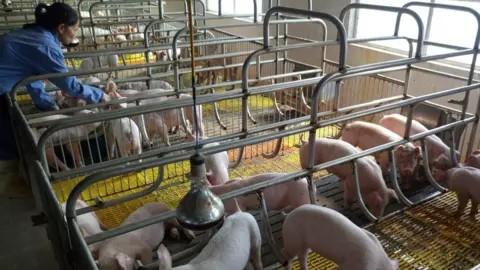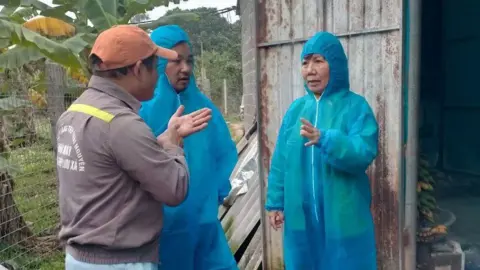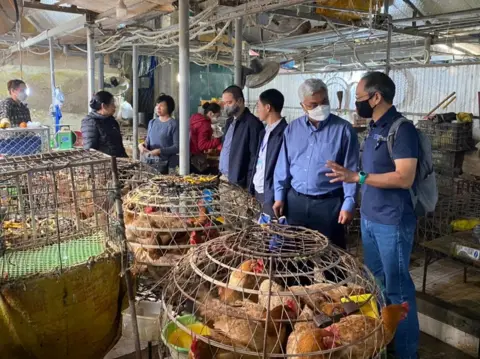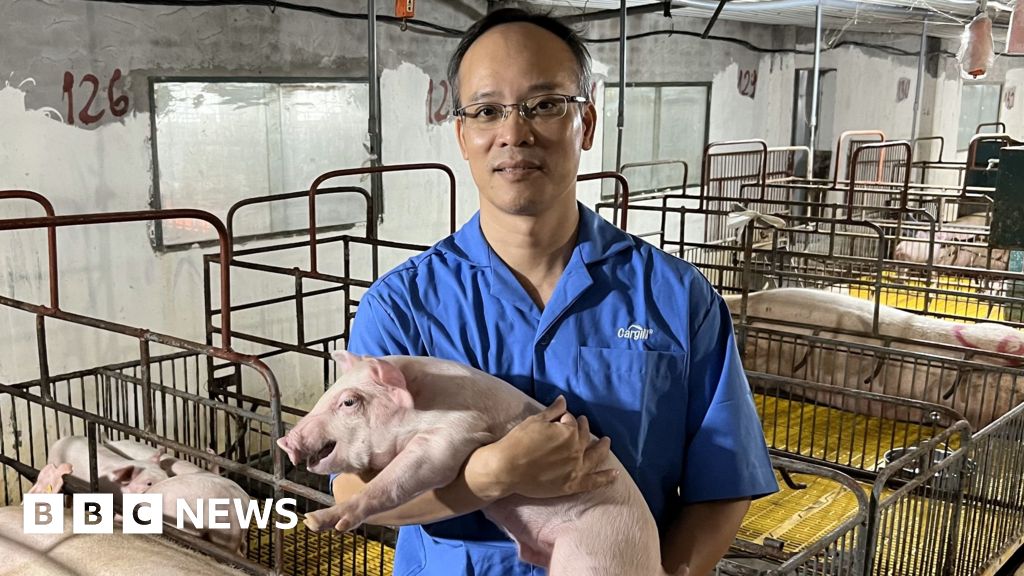 Quang Dong Hong
Quang Dong HongQuang Doan Hong is a busy man. The accountant, who lives with his family in Hưng Yên, Vietnam, also owns a farm with around 600 pigs.
He had to quickly learn about pig health, from the effectiveness of vaccines to the proper use of antibiotics.
“When the weather changes, I give the pigs antibiotics,” says Mr Hong. In his experience, rapid changes between sunny and rainy weather make it necessary to administer antibiotics against respiratory and diarrheal diseases.
Mr Hong also had to learn which sources of information were reliable. He joined farmers’ groups and researched online, although he realised that some information, such as on Facebook, was not reliable. “I have to filter it,” he explains.
As his business has grown, Mr. Hong is reluctant to have veterinarians visit him.
He worries about the risk of disease transmission from people who come into contact with animals in many different locations. Some large farms require veterinarians to quarantine for several days before visiting.
 FAO
FAOMr Hong would find a hybrid source of information useful: something that combines the expertise of veterinarians with the convenience of digital access.
Such technologies for remote treatment of animals are currently under development.
The team behind Farm2Vet, a veterinary app for farmers, recently won the grand prize of the Trinity Challenge, a charity that addresses global health threats.
The focus of the competition, which Farm2Vet won, was antimicrobial resistance (AMR) – the acute global threat posed by the lack of effectiveness of our limited antibiotic drugs due to pathogen adaptation.
Farms where antibiotics are overused can become breeding grounds for antibiotic-resistant bacteria. These bacteria then enter food production and the environment, for example through animal feces. Some drug-resistant bacteria, such as certain strains of E. coli, can spread between animals and humans.
“The misuse and overuse of antibiotics is largely due to a lack of understanding and support,” says Marc Mendelson, director of the Trinity Challenge and head of the Division of Infectious Diseases at the University Hospital Cape Town.
Antibiotics for animals can be extremely cheap, says Prof. Mendelson. “Some farmers probably don’t even know they are giving antibiotics because they are simply included in the feed.”
Vietnamese regulations now require a prescription for antibiotics for livestock. However, this regulation is relatively new and difficult to enforce. In practice, antibiotics are dispensed without a prescription, Pawin Padungtod admits.
Dr. Padungtod is based in Hanoi and is the Chief Technical Coordinator of the Emergency Centre for Transboundary Animal Diseases (ECTAD), a division of the Food and Agriculture Organization of the United Nations (FAO).
 Helen Nguyen
Helen NguyenHelen Nguyen grew up in Vietnam and now lives in the United States, where she is an environmental engineer at the University of Illinois Urbana-Champaign. Both countries have problems with the way farm animals are treated with antibiotics, she says.
In the US, medically important antibiotics are used far more frequently in livestock than in humans. And in Vietnam, says Professor Nguyen, only larger farmers can afford or have access to veterinarians.
Prof. Nguyen and the rest of the Farm2Vet team want to solve these problems in Vietnam by working with farmers, veterinarians and agricultural suppliers to develop a smartphone app that provides reliable information on animal care.
There would be an AI-powered chatbot to answer relatively simple questions and a connection to veterinarians in more complex cases.
“The technology we want to develop does not replace veterinarians,” says Prof. Nguyen. The goal is to enable veterinarians to expand their scope of activity.
In their view, the challenge lies not in developing the technology but in building the knowledge base.
While Vietnamese-language veterinary publications exist, the amount of data required to feed AI likely exceeds that available in Vietnamese. Since much of the veterinary publications are in English, it is important to carefully translate and localize information, even at the provincial level.
It will be years before the app is ready. Professor Nguyen says that while the app will be free for farmers, the goal is to enable advertising and a paid certification program for farmers for financial reasons.
 FAO-Vietnam
FAO-VietnamAlso in Vietnam, the International Livestock Research Institute is developing a similarly named app called FarmVetCare. The idea is that farmers will be able to use the app to report health abnormalities in livestock to a veterinarian. This will help prevent and control animal diseases and diseases that can be transmitted between animals and humans.
Another app is currently being piloted to extend the reach of the Vietnam Ministry of Animal Health’s digital animal disease outbreak reporting system. While the system currently allows daily online reporting at the provincial level, the goal is to further localize reporting and be as close to farms as possible.
“The mobile application will then be very helpful because they can now start reporting closer to the outbreak site,” says Dr. Padungtod.
Farmers may be reluctant to report animal diseases “because they don’t want to go bankrupt,” says Prof. Nguyen. The Farm2Vet app would allow farmers to report animal diseases anonymously, and the team would not share identifiable data with anyone, according to Prof. Nguyen.
Prof. Mendelson believes such tools are helpful as they can simplify the reporting process, especially for subsistence farmers.
They could also help prevent infections in the first place, which would reduce the need for expensive antibiotics. “The greatest impact is achieved by preventing infections – not only in humans but also in farm animals,” says Prof. Mendelson.
He notes that governments could encourage prevention by making vaccinations more accessible. And farmers could reduce the risk of infection by giving their livestock more space. Prof. Mendelson says: “Intensive livestock farming increases stress for the animals. It increases disease and risk.”
While there are many well-intentioned apps in the tech world that end up rarely used, Mr. Hong, the pig farmer, has expressed interest. He appreciates the convenience and ease of use of apps. “If they exist, I would like to use them,” he says.
- Translations by Lam Nguyen


